|
Shelf Awareness presents Shelf Awareness | Week of Tuesday, September 11, 2018
|
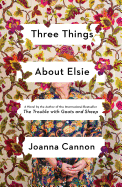 | Publisher: | | Scribner |
| Genre: | | Women, Mystery & Detective, Cozy - General, Literary, Suspense, Thrillers, Fiction
|
| ISBN: | | 9781501187384 |
| Pub Date: | | August 2018 |
| Price: | | $26 |
| Three Things about Elsie
by Joanna Cannon
Joanna Cannon's protagonist in Three Things About Elsie is nearing the end of her life rather than coming-of-age, as the heroines in her debut novel, The Trouble with Goats and Sheep, were. But 84-year-old Florence is just as engaging, and her tale includes a mystery.
A resident of the Cherry Tree Home for the Elderly, "Flo" relies on Elsie. Her best friend since childhood, Elsie shares Flo's days, filling in memory gaps and fending off behavior that might result in a transfer to the dreaded Greenbank facility. Flo adores Elsie, who "always undid the stitches of other people's worrying and made them disappear." However, the novel opens with Flo alone, at 4:48 p.m., lying on her sitting-room floor awaiting discovery after a fall, practicing what she'll say to her rescuers and musing over what will eventually be revealed: "Everyone's life has a secret."
Ending hours later, at 11:12 p.m., the story covers decades, including a long-ago tragedy the women shared. This pivotal event has abruptly resurfaced in the form of Cherry Tree's newest resident: a man who looks exactly like the villain who died following that incident.
Elsie and Flo set out to unravel the mystery of the newcomer, and their sleuthing revives memories--although Flo's can be unreliable. Past and present intertwine as they uncover truths, some more surprising than the man's identity. Flo and Elsie are endearing, and Cannon's diverse characters at the home enrich this charming story. -- Cheryl Krocker McKeon, manager, Book Passage, San Francisco |
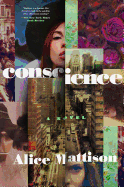 | Publisher: | | Pegasus |
| Genre: | | Women, General, Literary, Fiction, Historical
|
| ISBN: | | 9781681777894 |
| Pub Date: | | August 2018 |
| Price: | | $25.95 |
| Conscience
by Alice Mattison
Olive Grossman, a 60-something editor and writer, met Helen Weinstein at their Brooklyn high school and never quite recovered. Their friendship endured through college, when the antiwar movement reached fever pitch and the radicalized Helen came to regard Olive's commitment to nonviolence as gutless.
As Conscience opens, Olive's memories of Helen are revived when her husband, Griff, the principal of a high school for troubled kids, asks to borrow her copy of Bright Morning of Pain, a tawdry bestselling novel published in the 1980s. They both know that its author, Valerie Benevento, another childhood friend of Olive, based a central character on Helen. It's soon made clear that Valerie pilfered from other lives to fortify her novel and that Olive isn't being histrionic when she says of her long-ago four-year separation from Griff, "This book had been one of our problems."
Chapters that aren't narrated by Olive (with occasional perspective from Griff) are narrated by Jean Argos, the director of a New Haven agency dedicated to serving the homeless. Olive gets to know Jean--who may or may not be able to fill the vacancy Helen left in Olive's life--after the eternally high-minded Griff becomes president of the agency's board.
With her shatteringly incisive novel, Alice Mattison, whose previous books include When We Argued All Night, again swaddles a political moment with both quotidian details and pitiless insights into human nature. Conscience leaves the reader with the understanding that being conscientious and egotistical are hardly mutually exclusive. -- Nell Beram, author and freelance writer |
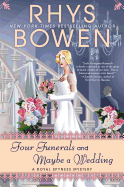 | Publisher: | | Berkley |
| Genre: | | Mystery & Detective, Amateur Sleuth, Fiction, Historical, Women Sleuths
|
| ISBN: | | 9780425283523 |
| Pub Date: | | August 2018 |
| Price: | | $26 |
| Four Funerals and Maybe a Wedding
by Rhys Bowen
Rhys Bowen, author of the Molly Murphy and Her Royal Spyness mystery series, returns to England with Lady Georgiana Rannoch in Four Funerals and Maybe a Wedding. The 12th of Lady Georgiana's adventures, but easily read as a standalone, this takes place in 1930s England, on the eve of Georgie's marriage to impoverished Irish lord Darcy O'Mara.
Georgie, cousin of the king of England, has to renounce her place in the royal line in order to marry a Catholic, but she is happy to do so. She's less thrilled when the king and queen invite themselves to her wedding, and assume she's inviting half the royal houses of Europe as well. Since Georgie is just as poor as Darcy, with only her regal name and an empty pocketbook, she's at her wit's end, when her previous stepfather (one of her mother's many ex-husbands) offers her the chance to live for free at his estate, Eynsleigh.
Georgie jumps at the chance, only to discover shifty servants and strange activities, which make her extremely nervous. Trying to play lady of the manor, Georgie attempts to make the servants do what they ought, but she begins to suspect that sinister things are happening at Eynsleigh.
Fast-paced, funny and full of royal cameos, Four Funerals and Maybe a Wedding is a delightful historical mystery. Georgie and her no-nonsense approach to life, plus her hilarious schemes to stay afloat financially, will keep the readers chuckling as she follows her suspicions. -- Jessica Howard, bookseller at Bookmans, Tucson, Ariz. |
 | Publisher: | | Black Cat/Grove |
| Genre: | | Crime, Literary, Thrillers, Fiction, Noir
|
| ISBN: | | 9780802128157 |
| Pub Date: | | August 2018 |
| Price: | | $16 |
| Don't Send Flowers
by Martín Solares
Martín Solares follows up The Black Minutes with Don't Send Flowers, another unpredictable descent into a region of Mexico teetering on the edge of complete lawlessness. It is reminiscent of Don Winslow's dark thrillers The Power of the Dog and The Cartel in its emphasis on the miseries wrought by the drug trade, but Solares's focus is firmly on the Mexican side of the border. His novel, translated from Spanish by Heather Cleary, centers on the all-too-common crime of kidnapping in the Gulf town of Ciudad Miel. In this case, the missing girl has a powerful father who convinces retired police detective Carlos Treviño to help find his daughter before it's too late.
Don't Send Flowers follows Treviño's painstaking investigation into the kidnapping. Treviño has a history with the local police that ended with his torture and desperate escape, so he has to dodge the cops as well as two cartels warring over territory. The scope of the story is complicated by surprising tangents and perspective shifts. Few characters seem untouched by what they refer to as "the trade": "Throw a rock and you'll hit someone living off the cartels, sometimes without even knowing it." Politicians, business owners, even the military are implicated. And Solares is unafraid to look through the eyes of borderline villainous characters, taking readers deep into the calculations and moral compromises they've made to stay alive or even prosper in what increasingly seems like a modern Wild West.
Revealing more would spoil the plot, but suffice to say that throughout the book's bold narrative choices, Solares maintains a deft touch for suspense. -- Hank Stephenson, bookseller, Flyleaf Books, Chapel Hill, N.C. |
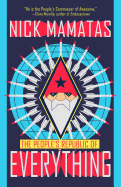 | Publisher: | | Tachyon |
| Genre: | | Collections & Anthologies, Short Stories (single author), Horror, Fantasy, General, Fiction, Science Fiction
|
| ISBN: | | 9781616963002 |
| Pub Date: | | August 2018 |
| Price: | | $15.95 |
| | Science Fiction & Fantasy |
The People's Republic of Everything
by Nick Mamatas
Nick Mamatas ( I Am Providence) creates landscapes in The People's Republic of Everything that are off-kilter yet disconcertingly familiar. This short story collection examines his recurring themes of "the body, technology, [and] materialism" with tales that span conventional narrative, science fiction and dystopian fantasy; dark themes abide, touched with a fair bit of humor.
The title story, "The People's Republic of Everything and Everywhere," introduces a narrator who is part of an anarchist scheme to steal the Q-chip: it breaks every code and cracks every password. "No walls, no doors" is the insurgents' motto. In "Arbeitskraft," factory workers are altered with prosthetic limb devices that repress an already downtrodden class. The main character, a rich man who fancies himself a liberal do-gooder, is used to "critique steampunk without creating an anti-steampunk story."
This collection also includes the preferred author edition of Under My Roof, a novel set in the near future when war is constant. A telepathic boy tells the very funny story of his father's homemade nuclear bomb and the reaction to his declaring their house a new country. Part Kurt Vonnegut and part The Mouse That Roared, it's a biting and relevant satire.
Mamatas adds author notes at the end of each story. The reader may come away with the feeling that it's a minor miracle that any of his unusual work sees print--and a very good thing that it does--because his underground aesthetic and slightly skewed imagination give adventurous readers a wild ride. -- Cindy Pauldine, bookseller, the river's end bookstore, Oswego, N.Y. |
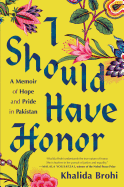 | Publisher: | | Random House |
| Genre: | | Biography & Autobiography, Women, Personal Memoirs, Social Activists
|
| ISBN: | | 9780399588013 |
| Pub Date: | | September 2018 |
| Price: | | $27 |
| |
Starred
|
Biography & Memoir |
I Should Have Honor: A Memoir of Hope and Pride in Pakistan
by Khalida Brohi
"Izzat mare, pen mare te maf" is a saying in Khalida Brohi's Pakistani tribe, translating as "Even if I have nothing, I should have honor." Born in a small village, Brohi understood the concept of honor was tied to her father. As his eldest daughter, she was the one who could dishonor him the most. Brohi's father, however, was exceptional. Rather than ascribing to centuries-old customs keeping women unempowered, he told her she would dishonor him the day she failed to bring home good grades. This freedom ("my father took the biggest weight from my shoulders and in its place attached two wings") and how it helped forge Brohi's life is the subject of I Should Have Honor.
Brohi's cousin was the victim of an honor killing at the age of 14. Brohi, herself just 16, was forever changed. Convinced education meant power, she began protesting and speaking out to local women. Facing resistance and threats, Brohi changed tack and formed the Sughar Empowerment Society, a nonprofit that helps women learn skills and earn income selling traditional embroidered products to the fashion industry.
Through Sughar, Brohi also educates women about gender equality and domestic violence, and her work has been recognized worldwide. Writing in natural, unadorned prose, Brohi captures the reader with her passion and indefatigability. Brohi's success, earned despite entrenched cultural obstacles ("Daughters are a blessing from God, but they are a tough gift to cherish. Everyone wants a piece of them. Always."), is a lesson in perseverance and familial courage. -- Lauren O'Brien of Malcolm Avenue Review |
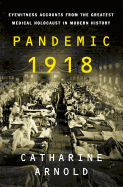 | Publisher: | | St. Martin's Press |
| Genre: | | World War I, Infectious Diseases, Medical, 20th Century, History, Modern, Military
|
| ISBN: | | 9781250139436 |
| Pub Date: | | August 2018 |
| Price: | | $27.99 |
| Pandemic 1918: Eyewitness Accounts from the Greatest Medical Holocaust in Modern History
by Catharine Arnold
Each year, up to 20% of the population will get the flu. Most individuals will recover with no complications. A small percentage will require hospitalization, and an even smaller percentage (usually the very young or the very old) will die. In 1918, at the end of World War I, this was not the case; more than one-third of the world's population caught the pandemic Spanish flu. Popular historian and journalist Catharine Arnold (Necropolis: London and Its Dead) follows the course of a virus that killed 25 million people in its first 25 weeks and more than 50 million people worldwide. Medical historians would call it the greatest medical holocaust in history--deadlier than the Great Plague.
Spanish flu struck down politicians and average Joes with equal intensity, differing from seasonal influenza by killing the young and healthy, rich as well as poor: "Indeed, by the end of the war, more Americans would have died from Spanish flu then perished in the war." Spanish flu made orphans out of 600 children in New York, caused a shortage of coffins and gravediggers in Philadelphia and turned Armistice Day into a protracted death march.
Arnold painstakingly reviews eyewitness accounts from survivors, diaries, newspaper reports and military and medical records. Spanish flu continued to haunt researchers nearly 80 years later, when tissue samples from excavated remains revealed it to be a form of avian flu, and when prospects of another epidemic loomed heavily on the horizon.
A 1918 London Times quote sums up the impact of the Spanish flu: "Never since the Black Death had such a plague swept over the world; never, perhaps, has a plague been more stoically accepted." -- Nancy Powell, freelance writer and technical consultant |
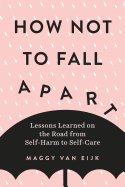 | Publisher: | | TarcherPerigee |
| Genre: | | Self-Help, Psychology, Depression, General, Mental Health, Self-Management, Mood Disorders
|
| ISBN: | | 9780143133490 |
| Pub Date: | | September 2018 |
| Price: | | $16 |
| How Not to Fall Apart: Lessons Learned on the Road from Self-Harm to Self-Care
by Maggy van Eijk
"The world in which depression and anxiety reign supreme is extremely lonely," writes Maggy van Eijk in the introduction to her book How Not to Fall Apart. "I wanted to write this book to reach out and say: 'Hey there, you're not alone, I'm right there with you.' " By documenting her own experiences living with mental illness--anxiety and depression, but also a variety of other co-existing diagnoses--van Eijk offers both community and advice to readers.
How Not to Fall Apart is full of lists: things to do to find comfort on a tough day; activities to consider instead of self-harm; a checklist for "when your brain is ready to jump to conclusions"; great places to cry it out. On their own, the lists could be seen as fluffy. Interjected throughout van Eijk's very personal account of struggling with anxiety, depression and self-harm, the lists become a window into one person's coping mechanisms, offered with a suggestion for personalization. (Note that readers who may be triggered by accounts of self-harm, sexual assault or other traumas may want to avoid this one, as van Eijk doesn't shy away from such details.)
That's the thing about mental health: it's incredibly personal, specific to the experiences of each individual. Books like How Not to Fall Apart can't offer a one-size-fits-all solution to living with anxiety or depression. But they can offer a reminder that there is hope, even when it's hard to find, and that we are not alone in our struggles, no matter how exceptional they may be. -- Kerry McHugh, blogger at Entomology of a Bookworm |
 | Publisher: | | Mountaineers Books |
| Genre: | | Photography, Biography & Autobiography, Photojournalism, Adventurers & Explorers
|
| ISBN: | | 9781680511048 |
| Pub Date: | | August 2018 |
| Price: | | $26.95 |
| |
Starred
|
Travel Literature |
Arctic Solitaire: A Boat, a Bay, and the Quest for the Perfect Bear
by Paul Souders
Paul Souders has been a wildlife and nature photographer for more than 30 years, yet he'd never captured a polar bear on film in its natural Arctic environment. Disinclined to join a tour group where his photographs would be the same as everyone else's, Souders bought a rubber dinghy and a wooden boat called C-Sick and went solo into Hudson Bay. Over the course of several summers, he traversed hazardous waterways in search of an iconic polar bear image.
Arctic Solitaire is Souder's first book and is based on the notes he took while on these expeditions. He holds little back, sharing with readers his distinct lack of knowledge for reading the sea and the weather, as he was caught in one storm after another. Pack ice threatened to crush his boat, strong winds drove him onto submerged rocks and even the bears he came to photograph almost did him serious harm. But amid that desolation, he did capture numerous polar bears and other wildlife on film, all of which he describes in loving and lyrical tones. Interspersed with his personal narrative are reflections on the history of previous arctic explorers as well as commentaries on the native Inuit he encountered in the tiny, isolated villages he visited. Arctic Solitaire is also filled with beautiful color images that mirror the story he tells. This is a great read about a harsh region of the world few get to see on their own. -- Lee E. Cart, freelance writer and book reviewer
|
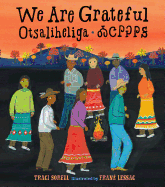 | Publisher: | | Charlesbridge |
| Genre: | | United States - Native American, Concepts, Values & Virtues, People & Places, Social Topics, Seasons, Juvenile Nonfiction
|
| ISBN: | | 9781580897723 |
| Pub Date: | | September 2018 |
| Price: | | $17.99 |
| |
Starred
|
Children's & Young Adult |
We Are Grateful: Otsaliheliga
by Traci Sorell, illust. by Frané Lessac
Cherokee poet Traci Sorell makes her picture book debut with We Are Grateful: Otsaliheliga, illustrated by the prolific Frané Lessac.
"Cherokee people say otsaliheliga to express gratitude. It is a reminder to celebrate our blessings and reflect on struggles--daily, throughout the year, and across the seasons." With seasonal chapter headings in both English and Tsalagi, Cherokee, Sorell takes the reader through a year in the life of contemporary citizens of the Cherokee Nation. Using the refrain "we say otsaliheliga" (pronounced oh-jah-LEE-hay-lee-gah), each season is given special joys, sorrows and celebrations both specific and generic, personal and communal.
In autumn (uligohvsdi), gratitude is voiced as shell shakers dance around the fire during the Great New Moon Ceremony; it is expressed as citizens of the Cherokee Nation clean their homes, don new clothes and feast to welcome the Cherokee New Year; it is communicated through acts of remembrance for "ancestors who suffered hardship and loss on the Trail of Tears." In winter (gola), "[a]s bears sleep deep and snow blankets the ground," the large, tightly knit community is thankful for the stories of elders and for traditional lullabies.
Lessac's folk art-style gouache illustrations depict the diversity of contemporary life experiences described in Sorell's text. On one spread, the family hugs a "clan relative" dressed in fatigues as he heads off "to serve our country"; on another, children play in a cornfield as "the crops mature and the sun scorches." In Sorell's author note, she says "Cherokee culture places a strong emphasis on expressing gratitude to unelanvhi... literally 'the one who provides all,' " as well as for "one another." An elegant representation of this concept, We Are Grateful has the ability to resonate with any reader: "Otsaliheliga for all who came before us, those here now, and those yet to come." -- Siân Gaetano, children's and YA editor, Shelf Awareness |
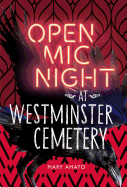 | Publisher: | | Carolrhoda Lab/Lerner |
| Genre: | | Black Comedy, Humorous, Music, Ghost Stories, Young Adult Fiction, Performing Arts
|
| ISBN: | | 9781512465310 |
| Pub Date: | | September 2018 |
| Price: | | $18.99 |
| Open Mic Night at Westminster Cemetery
by Mary Amato
"Lacy's scream is loud enough to wake the Dead, and that is precisely what is happening." Sixteen-year-old Lacy Brink wakes, thoroughly confused, in Westminster Cemetery. Turns out, she's dead. She quickly learns that the afterlives of the cemetery's Dead are governed by strict rules, enforced by the unforgiving Mrs. Steele. Rule-breaking in Westminster has consequences--"[t]hree strikes and you become one of the Suppressed, which means you lose your aboveground privileges." (The cemetery's most famous resident, Edgar Allan Poe, is among the Suppressed.) Horrified Lacy tries to adapt to her afterlife with the help of earnest 17-year-old Civil War soldier Sam. Lacy is assigned to host an evening of entertainment and proposes an open mic night "to create a space for self-expression." The residents of Westminster crave a change from the monotony, but are they bold enough to accept Lacy's radical proposal, open up and risk Mrs. Steele Suppressing them all?
Mary Amato's inventive Open Mic Night at Westminster Cemetery finds humor in the grave. Formatted as a play, with a helpful narrator occasionally chiming in, Open Mic Night dares readers to laugh at the macabre. Even though the main cast is already dead, the threat of Suppression is serious enough to create notable tension, and the revealed secrets of a few characters are memorable and affecting. Additionally, Lacy's liberal use of profanity (she's particularly fond of yelling "F*ck!" in the quiet graveyard) allows the reader to feel as jarred by her presence as the Dead do. Open Mic Night reinvents the afterlife in a way that's both mysterious and playful. -- Kyla Paterno, former YA and children's book buyer |
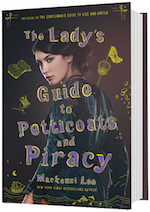 | Publisher: | | Katherine Tegen/HarperCollins |
| Genre: | | Romantic Comedy, Class Differences, Romance, Family, Social Themes, Young Adult Fiction, Historical, Siblings
|
| ISBN: | | 9780062795328 |
| Pub Date: | | October 2018 |
| Price: | | $18.99 |
| The Lady's Guide to Petticoats and Piracy
by Mackenzi Lee
In The Lady's Guide to Petticoats and Piracy, her splendid historical novel/fantasy/pirate adventure/feminist anthem, Stonewall Book Award honoree Mackenzi Lee raises questions about such intertwined topics as colonialism, science, naturalism and even magic.
"You are Felicity Montague, I remind myself.... You have sailed with pirates and robbed tombs and held a human heart in your hands and sewn your brother's face back together after he got it shot off over said human heart.... You deserve to be here."
Felicity Montague frequently needs to give herself pep talks. Having denounced her family and devoted herself to studying preventative medicine, Felicity finds herself exactly where she doesn't want to be: facing a man who wants to make her his wife, with everything that title entails in 18th-century Europe. She's been working for a kind Scottish baker while trying to get medical schools interested in accepting her, and he has fallen in love with her. Panicked, and a little bit torn--capitulation to a traditional marriage would be easier in many ways--Felicity flees to London where her brother, Monty, and his best-friend-turned-lover, Percy, are living.
She persists in reaching out to doctors and schools but none will take her seriously, in spite of her obvious intelligence, commitment and autodidactic scholarship. Learning that her maverick idol, Dr. Alexander Platt, may be in the market for an assistant on a research expedition, Felicity jumps at the chance to track him down. As it turns out, Platt is about to marry Felicity's best childhood friend, Johanna, with whom she had a falling out a few years earlier. Monty and Percy (who disapprove of Felicity "gallivanting off" again) inadvertently introduce Felicity to her ticket to that chance: Sim, an Algerian Muslim woman and erstwhile pirate, offers to help her get to Stuttgart, Germany, where the wedding is to take place.
Thus begins the most adventurous whirlwind "grand tour" since, well, the previous year, when Felicity traveled Europe with Monty and Percy (The Gentleman's Guide to Vice and Virtue). Twists and turns and tangles of fate result in the three unlikely traveling companions--Felicity, Johanna and Sim--banding together in a race against time, overbearing macho pirates and drug-addled scientists.
Each of the women has a driving passion to do "work that matters": Felicity, to become a doctor; Johanna, a naturalist; and Sim, a pirate commodore with an environmental preservationist bent. The three challenge each other in unexpected ways. Felicity, who has rested in the odd security of her reputation as a "feral girl in a domesticated world," learns to confront intimacy and her fear thereof. She begins to understand that she may in fact be what her 21st-century cohorts would call asexual, but that being "in the company of women like this--sharp-edged as raw diamonds but with soft hands and hearts, not strong in spite of anything but powerful because of everything"--makes her feel invincible. Johanna grapples with her desire to be flirtatiously feminine even while grubbing around in the natural world. Sim rails against the inherent sexism in a patriarchal society; as firstborn, she wants to claim her birthright, but she knows her younger, less qualified brothers are likely to inherit her father's fleet of pirate ships. All three women struggle mightily for agency and independence in their lives.
In the midst of all this adventure and personal growth, they also manage to be hilariously, dryly funny, particularly Felicity: "I wrote to Monty before we left Zurich, informing him I was safe and in, if not good, at least neutral company, and that I would not be back in London as soon as I'd planned. I did not mention that there was a good chance I might be running off to join a pirate expedition to protect sea monsters. I have a sense that would get his breeches in a twist."
A fierce feminism permeates Mackenzi Lee's swashbuckling sequel to The Gentleman's Guide to Vice and Virtue. Fans of the first novel will be pleased to see its heroes--Monty and Percy--happy now (if impoverished) and to enter an entire new chapter of the Montague family drama. Felicity is supremely likable in all her flaws, and sophisticated readers will appreciate how she learns to hold a mirror up to herself even though she could easily convince herself that she is unique and special due to her determination to break deeply rooted misogynistic traditions. She is special, it's true, but she's not alone, and her way through the world is only one of many.
Lee, who has also produced such literary treasures as Bygone Badass Broads and This Monstrous Thing, weaves together folklore and science, history and imagination to create a world so rich in detail and imagery, readers will emerge from the book's covers blinking just as they would coming out of a movie theater. As Felicity herself would say: Zounds! --Emilie Coulter
|
|
» http://www.shelf-awareness.com/sar-issue.html?issue=748
|











